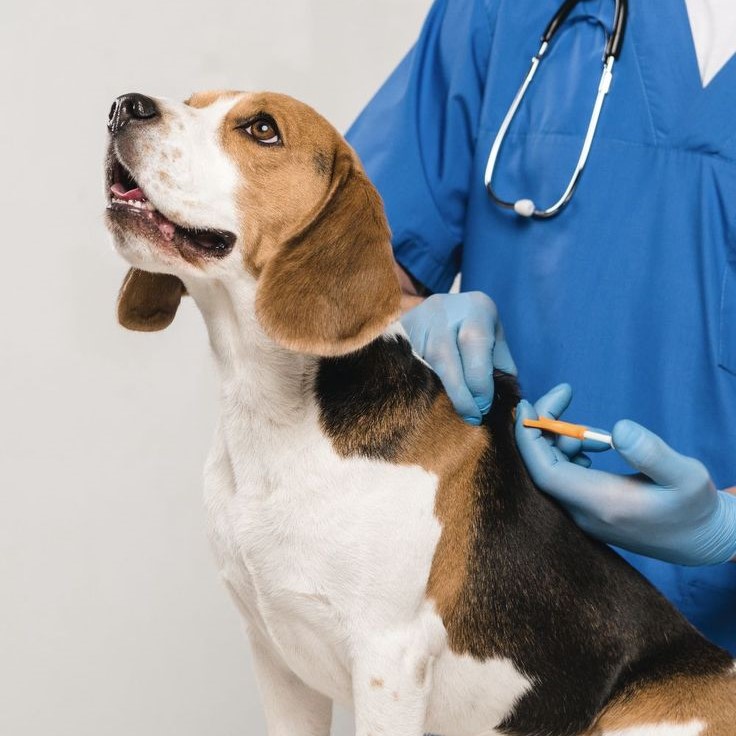What Is a Dog Autoimmune Disease?
A dog autoimmune disease is a condition where the dog’s immune system mistakenly attacks its own body cells, tissues, or organs. This happens because the immune system cannot distinguish between healthy cells and harmful invaders. As a result, the body becomes inflamed and damaged over time.
Autoimmune diseases can affect various parts of a dog’s body, such as the skin, joints, blood, and even internal organs. These conditions are not contagious, but they can be serious if left untreated. It is important to recognize the signs early so that proper treatment can begin.

In some cases, the exact cause of an autoimmune disease in dogs remains unknown. However, factors like genetics, environmental triggers, and underlying health issues may play a role. Understanding what happens inside a dog’s body during an autoimmune reaction can help owners make informed decisions about their pet’s care.
Early detection and treatment are crucial. Regular check-ups with a veterinarian can help identify potential problems before they become severe. Owners should also stay informed about the latest research and treatment options available for this type of condition.
By learning more about dog autoimmune disease, you can take proactive steps to support your pet’s long-term health and well-being.
Common Causes of Dog Autoimmune Diseases
Autoimmune diseases in dogs can have multiple causes, and researchers are still studying exactly how these conditions develop. However, several factors are believed to contribute to the onset of autoimmune reactions in dogs.
Genetics plays a major role in many cases. Certain breeds are more prone to autoimmune diseases than others. For example, German Shepherds, Poodles, and Cocker Spaniels are often affected by conditions like lupus or autoimmune hemolytic anemia. This suggests that inherited traits may increase the risk of developing such illnesses.
Environmental factors can also trigger autoimmune responses. Exposure to toxins, certain medications, or even infections might cause the immune system to malfunction. In some cases, vaccines or other medical treatments may act as triggers, especially in dogs with a predisposition to autoimmunity.
Another possible cause is chronic stress. Dogs that experience prolonged stress or anxiety may have weakened immune systems, making them more susceptible to autoimmune disorders. Stress can come from various sources, including changes in environment, lack of social interaction, or poor diet.
Nutritional deficiencies can also impact the immune system. A diet lacking essential vitamins and minerals may leave a dog vulnerable to health issues, including autoimmune diseases. Ensuring a balanced and nutritious diet is an important part of preventing and managing these conditions.
Lastly, age and hormonal changes can influence the development of autoimmune diseases. Older dogs may be more likely to develop these conditions due to natural changes in their bodies. Hormonal imbalances, such as those caused by thyroid or adrenal issues, can also play a role.

Understanding the causes of dog autoimmune disease helps owners and veterinarians work together to prevent and manage these complex conditions effectively.
Signs and Symptoms of Autoimmune Disease in Dogs
Recognizing the symptoms of dog autoimmune disease is essential for early diagnosis and treatment. The signs can vary depending on which part of the body is affected, but there are some common indicators that owners should watch for.
One of the most noticeable symptoms is unexplained weight loss. Dogs with autoimmune diseases may lose weight rapidly without any change in diet or activity level. This can be a sign that the body is struggling to function properly.
Another common symptom is lethargy. Affected dogs may appear tired, less active, or show a lack of interest in their usual activities. This can be mistaken for normal aging, but it is often a red flag when combined with other symptoms.
Skin issues are also frequently seen in dogs with autoimmune diseases. Rashes, hair loss, and sores may appear on the skin. Some dogs may experience excessive itching or develop lesions that do not heal easily.
Gastrointestinal problems are another indicator. Dogs may suffer from vomiting, diarrhea, or loss of appetite. These symptoms can be difficult to attribute to a specific cause, but they often point to an underlying immune disorder.
Joint pain and swelling are common in dogs with autoimmune arthritis. Affected dogs may have difficulty walking or moving normally. They may also show signs of stiffness, especially in the morning or after resting.
Other symptoms include fever, pale gums, and unusual bleeding or bruising. These can indicate that the immune system is attacking the body’s own cells, such as red blood cells or platelets.
If you notice any of these symptoms in your dog, it is important to consult a veterinarian. Early detection can significantly improve the chances of successful treatment.
How Is Dog Autoimmune Disease Diagnosed?
Diagnosing dog autoimmune disease requires a thorough examination by a qualified veterinarian. Since the symptoms can overlap with other conditions, it is important to conduct a series of tests to determine the exact cause of the illness.
The first step is usually a physical exam. The vet will look for visible signs of illness, such as skin changes, joint swelling, or abnormal behavior. They will also ask about the dog’s medical history and any recent changes in lifestyle or environment.
Blood tests are a key part of the diagnostic process. A complete blood count (CBC) can reveal abnormalities in red blood cells, white blood cells, or platelets.
In some cases, a biopsy may be necessary. A small sample of tissue from the affected area is taken and examined under a microscope. This can provide valuable information about the nature of the disease and guide treatment decisions.

Imaging tests, such as X-rays or ultrasounds, may also use to assess internal damage. These tools can help identify organ involvement or other complications related to the autoimmune condition.
Once all the results are reviewed, the veterinarian can make a diagnosis and recommend a treatment plan. Early and accurate diagnosis is critical for managing autoimmune diseases in dogs effectively.
Treatment Options for Canine Autoimmune Diseases
Corticosteroids are commonly used to suppress the immune system and reduce inflammation. Drugs like prednisone are effective in controlling autoimmune reactions, but they must use carefully to avoid side effects. Long-term use can lead to issues like weight gain, increased thirst, and susceptibility to infections.
Immunosuppressive drugs may also be prescribed. Medications such as azathioprine or cyclosporine can help regulate the immune system and prevent it from attacking the body’s own cells.
Supportive therapies are an important part of treatment. Nutritional supplements, such as omega-3 fatty acids or antioxidants, can help strengthen the immune system and reduce inflammation. A balanced diet is also essential for maintaining overall health.
Regular monitoring is crucial. Dogs undergoing treatment for autoimmune diseases need frequent check-ups to ensure that the medications are working and that no new complications arise. Blood tests and physical exams help track progress and adjust the treatment plan as needed.
In some cases, alternative therapies like acupuncture or herbal medicine may be considered. While these approaches are not a substitute for conventional treatment, they can complement it and improve the dog’s quality of life.
Ultimately, the treatment of dog autoimmune disease requires a personalized approach. Each case is unique, and the best outcome depends on early diagnosis, proper medication, and consistent care.
Living with a Dog with Autoimmune Disease
Caring for a dog with autoimmune disease requires patience, attention, and a commitment to ongoing management. While the condition can be challenging, many dogs live happy and fulfilling lives with proper care and support.
One of the most important aspects of care is following the veterinarian’s recommendations closely. This includes administering medications as prescribed, attending regular check-ups, and watching for any changes in the dog’s behavior or health.

Dogs with autoimmune diseases often require a special diet. A high-quality, balanced diet can help support the immune system and reduce inflammation. Owners should work with their vet to create a nutrition plan that meets the dog’s specific needs.
Exercise is also important, but it should be adjusted based on the dog’s energy levels and physical condition. Gentle walks and low-impact activities can help keep the dog active without causing undue stress or fatigue.
Emotional support is just as vital as medical care. Dogs thrive on routine and affection, and a stable, loving environment can help reduce stress and promote healing. Owners should remain patient and attentive, as changes in the dog’s behavior may signal a need for adjustment in the care plan.
It is also important to monitor for side effects from medications. Corticosteroids and immunosuppressants can have various impacts on the dog’s body, and any unusual symptoms should report to the vet promptly.
With the right care and attention, dogs with autoimmune diseases can enjoy a good quality of life. Staying informed and proactive is key to ensuring the best possible outcome for the pet.
Preventing Autoimmune Diseases in Dogs
While it is not always possible to prevent autoimmune diseases in dogs, there are steps that owners can take to reduce the risk and support their pet’s overall health. Prevention starts with a proactive approach to wellness and a focus on long-term care.
One of the most important preventive measures is maintaining a healthy lifestyle for the dog. A balanced diet rich in essential nutrients can help strengthen the immune system and reduce the likelihood of chronic health issues. Avoiding processed foods and focusing on high-quality, whole ingredients is a good starting point.
Regular exercise is also beneficial. Physical activity helps maintain a healthy weight, improves circulation, and supports mental well-being. However, it is important to tailor the exercise routine to the dog’s individual needs and abilities.
Vaccinations and parasite control are essential components of preventive care. Keeping up with recommended shots and deworming schedules can help protect the dog from infections that may trigger an autoimmune response. However, owners should discuss vaccine protocols with their vet to avoid over-vaccination.
Stress management is another key factor. Dogs that experience chronic stress may be more prone to immune-related issues. Providing a stable environment, regular routines, and plenty of social interaction can help reduce stress and promote emotional balance.
Early detection is crucial. Regular veterinary check-ups allow for the early identification of potential health concerns. Routine blood tests can detect subtle changes in the immune system before symptoms become severe.
By taking these preventive steps, owners can give their dogs the best chance at a healthy, active life. While autoimmune diseases cannot always avoid, a proactive approach can make a significant difference in the dog’s overall well-being.

Conclusion
Dog autoimmune disease is a complex and challenging condition that affects many pets. However, with the right knowledge and care, it is possible to manage the disease and improve the dog’s quality of life. Understanding the causes, recognizing the symptoms, and seeking timely treatment are essential steps in the journey.
Owners play a vital role in supporting their pets throughout the process. From following medical advice to providing emotional and nutritional support, every action contributes to the dog’s recovery and long-term health. By staying informed and involved, pet parents can make a real difference.
Prevention is also an important aspect of managing autoimmune diseases. A healthy lifestyle, regular check-ups, and stress reduction can help lower the risk of developing these conditions. Even if a dog does develop an autoimmune disorder, early intervention and proper care can lead to positive outcomes.
As research continues to advance, new treatment options and management strategies are becoming available. Staying updated on the latest developments in veterinary medicine can help owners make the best choices for their pets.
In summary, while dog autoimmune disease presents challenges, it is manageable with the right approach. By working closely with a veterinarian and remaining committed to the dog’s well-being, pet owners can help their furry friends live longer, healthier lives.









